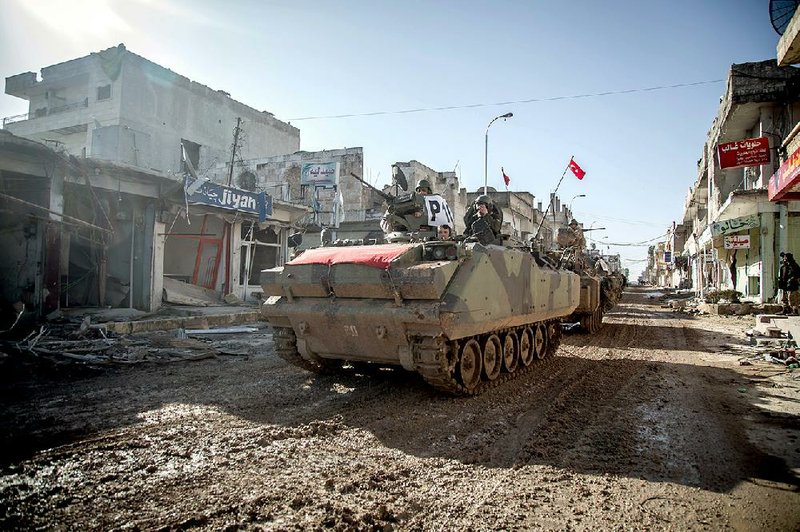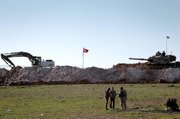Correction: Syrian Kurds are the fighters who have helped battle Islamic State militants but who Turkey argues are an extension of the Kurdistan Workers’ Party, an outlawed separatist group. This article was based in part on New York Times reporting misidentified the Kurdish fighters as the peshmerga, who are the military forces of Iraqi Kurdistan.
ANKARA, Turkey -- Hundreds of Turkish troops backed by tanks took part in an operation into neighboring Syria to evacuate dozens of besieged soldiers guarding an Ottoman tomb and removed the remains amid fears the shrine was threatened by Islamic State militants.
The mission late Saturday, saving Turkish soldiers reportedly stuck for months at the tomb of the grandfather of the founder of the Ottoman Empire, was the first such major military incursion by Turkey since the Syrian conflict began in March 2011.
Turkish Prime Minister Ahmet Davutoglu said nearly 600 Turkish soldiers on some 100 tanks and armored personnel carriers crossed into Syria near the border town of Kobani late Saturday, as drones and airplanes flew reconnaissance missions overhead.
One group traveled to the tomb, 22 miles from Turkey on the banks of the Euphrates River in Syria's embattled Aleppo province, he said. Another group seized an area 200 yards from the Turkish border in Syria's Ashma region to be the new home for the tomb, according to a statement from President Recep Tayyip Erdogan's office.
Davutoglu said there were no clashes during the mission and only one casualty, a soldier who was killed in an accident.
The forces reached the tomb shortly after midnight.
"A religious ceremony was held for the transfer of the tomb remains while other items of cultural significance were removed with similar care," Davutoglu said. "Our troops were safely removed from the area."
Finally, he said, the Turkish flag was lowered, and the tomb and security station were destroyed to prevent any possible use by extremists.
"Before the Turkish flag was lowered at [the tomb], the Turkish flag started to be waved at another location in Syria," Davutoglu said.
Turkish media later showed images of three Turkish soldiers raising the country's flag at the new site.
Davutoglu said that when conditions in Syria permitted, the tomb would be moved back again to the site that was evacuated, near the village of Karakozak.
The U.S.-led coalition forces were informed of the Turkish operation after its launch to prevent any casualties, Davutoglu said.
U.S. Secretary of State John Kerry, while in London, spoke by telephone Sunday with Turkey's foreign minister and expressed condolences over the Turkish soldier killed during the operation, the State Department said. It said the U.S. and Turkey were in close and continuing coordination on developments in Syria, including intelligence sharing.
Syria's Foreign Ministry denounced the Turkish operation, calling it a "flagrant aggression." In a statement carried by the state news agency, it also said the mission demonstrated "the depth of ties" between Turkey and the Islamic State extremist group. Syria routinely accuses Turkey of supporting the group.
The ministry said Ankara informed the Syrian Consulate in Istanbul ahead of the operation but did not wait for approval from Damascus.
Iran's deputy foreign minister, Hossein Amir Abdollahian, said there is no justification for Turkey's military action. Iran is a close ally of Syria.
Turkish Foreign Minister Mevlut Cavusoglu said Ankara had notified Syria before the operation that it was vacating the tomb temporarily and that it will return to the area when it is "ready" to do so.
"We got permission from no one, we conducted it with our own initiative," he said.
The Turkish Foreign Ministry said the operation was prompted by the chaos and instability in Syria. The Turkish news channel NTV reported that the government had received warnings in recent days that clashes were likely to break out nearby between forces of the Islamic State and Kurdish troops known as peshmerga, and that the tomb could become a target.
"The Suleyman Shah tomb has been a point of vulnerability for Turkey for a long time, and with this operation, such weakness has been eliminated," said Sinan Ulgen, the chairman of the Istanbul-based Center for Economics and Foreign Policy Studies and a visiting scholar at Carnegie Europe in Brussels. "The Islamic State could have used the presence of the tomb as leverage in case of any confrontation with Turkey."
Rumors had swirled for months that the soldiers stationed at the tomb had been besieged by militants from the Islamic State, which holds a third of Syria and neighboring Iraq in its self-declared caliphate. Some 40 Turkish soldiers once guarded the tomb, making them a target for the Islamic State and other militant groups in Syria's long-running civil war.
Tensions have mounted around the tomb since March, when the Islamic State took control of the surrounding area and began threatening to destroy the tomb unless guards there lowered the Turkish flag.
The tomb housed the remains of Shah, the grandfather of Osman I, founder of the Ottoman Empire. The site along the Euphrates River is revered by Turkey, a strongly nationalist country whose rights there stem from a 1921 treaty with France, then the colonial power in Syria. The Ottoman Empire collapsed in the early 20th century after World War I.
In the 1970s, Turkey moved the mausoleum to its next location because the old site at a castle farther south in Syria was to be inundated by the waters of a new dam.
Davutoglu said that in accordance with the 1921 treaty, the new tomb was being established in a part of Syria that is under Kurdish control.
Shah, a Turkic leader, is believed to have drowned in the Euphrates in the 13th century. His followers headed north into what is today Turkey, where they established the Ottoman Empire. Some historians question official accounts about Shah's tomb, saying they might have been retrospectively concocted to enrich an imperial identity for Turks.
With its 750-mile border with Syria, Turkey could be a major player in the fight against the Islamic State.
The Islamic State raided Turkey's consulate in Mosul, Iraq, in June and seized 46 Turks and three Iraqis as hostages; they were released three months later on terms that were not disclosed. That crisis discouraged Turkey from joining the U.S.-led military coalition conducting strikes against the Islamic State, though Turkey has cooperated with the U.S. in other ways, including an agreement signed Friday to train and equip moderate Syrian rebels on Turkish soil.
Turkey has wanted Syrian President Bashar Assad overthrown and has backed some rebels fighting against him.
The nation has lobbied for international military action in Syria, including no-fly zones and a presence on the ground to strengthen the more moderate Syrian rebel groups who are fighting both the extremists and the Syrian government. Turkey is also concerned about containing the flow of refugees from Syria, more than 3 million of whom have already been sheltered in Turkey.
Turkey also has had concerns over some of the Kurdish fighters battling the Islamic State in Kobani. It views the Kurds fighting in Syria as an extension of the Kurdistan Worker's Party, which has waged a 30-year insurgency against the Turkish government and is designated as a terrorist group by the U.S. and NATO.
Information for this article was contributed by Suzan Fraser, Ryan Lucas and Bradley Klapper of The Associated Press and by Sebnem Arsu of The New York Times.
A Section on 02/23/2015


